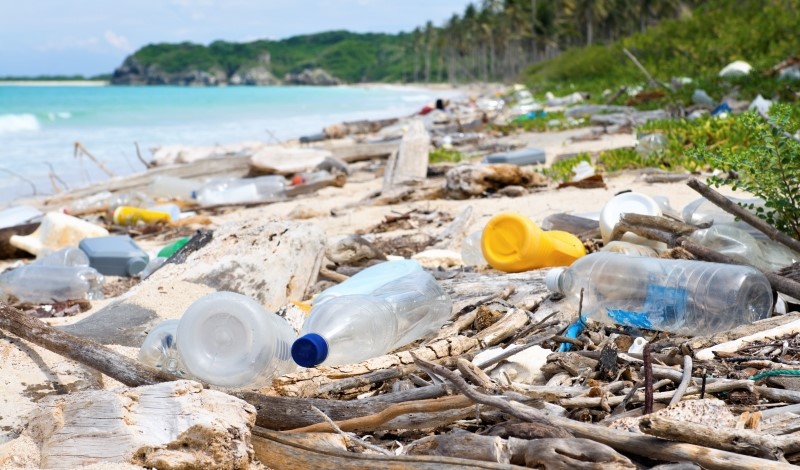
Scholars discuss different legal regimes to reduce marine litter and acidification.
Each day, over 2,000 garbage trucks full of plastic are dumped into the world’s oceans, rivers and lakes. Pieces less than five millimeters long, known as microplastics, enter the food and water supply and accumulate in vital organs—particularly the lungs.
Some scholars have expressed concern about the efficacy of the current legal system to combat oceanic pollution and have put forward novel international or environmental legal regimes to keep Earth’s waters clean.
At present, multiple international agreements dedicated to the preservation of marine environments already exist.
One such global initiative focusing on the regulation of hazardous and plastic waste in the ocean is the Basel Convention on the Control of Transboundary Movements of Hazardous Waste and their Disposal. The Basel Convention was enacted in 1992 and is recognized by 188 United Nations member states. Scholars have criticized the Convention, however, for exempting from its coverage plastics dangerous to human health. Furthermore, the United States has not ratified the treaty, capping its potential.
Although the United States entered into a bilateral 2020 Arrangement with Canada, this agreement was negotiated in secrecy and sought to bypass new protections introduced in an amendment to the Basel Convention. The 2020 Arrangement is also non-binding—its purpose appears to have been to “enable business as usual.”
Across the Atlantic, the European Union recently reached a political agreement to prohibit the exporting of plastic waste from the EU to any country not within the Organization for Economic Cooperation and Development (OECD) in order to reduce the negative impacts of pollution caused by marine plastics. This agreement is a smaller initiative within the broader goals of the European Green Deal, which outlines a broader plan to “monitor, report, prevent, and remedy” marine pollution. This agreement, formally adopted in April of 2024, serves as a response to the Waste Shipment Regulation of 2006 that ultimately failed to reduce exports of EU waste into non-OECD countries.
Other scholars have focused their research on addressing carbon emissions and their impact on both the ocean and the atmosphere.
But solely accounting for carbon dioxide levels in the atmosphere has inherent limitations—this model fails to address externalities of carbon emissions such as ocean acidification, iron regulation, algae health, and the regulation of vessel emissions. Multivariate models that capture some of these related effects demonstrate the need for an even more substantial decrease of carbon emissions than would be predicted by atmospheric analysis alone.
This week’s Saturday Seminar explores potential legal solutions to the problem of oceanic pollution.
- In an article in the Yale Journal of International Law, practitioner Gershon Hasin proposes restructuring the jurisdiction of exclusive economic zones (EEZs) to optimize oceanic resource usage. He explains that EEZs are regions in which coastal countries maintain jurisdiction over both living and non-living resources. Hasin argues that these rights should be transformed from the current regime, which is described as “inclusive rights” in the waters, to an exclusive system where nations possess total jurisdiction. He contends that this new system would increase the responsibility of individual states and could thus solve the “tragedy of the commons” problem in ocean law, particularly as it concerns the legality of unmanned vessels, fishery depletion, fragile marine environments, and human rights violations.
- In a recent article in Elementa: Science of the Anthropocene, Erik van Doorn of Australia’s University of Wollongong and several coauthors argue that the interaction between ocean and atmosphere is often underappreciated or ignored by marine regulators and policymakers. Van Doorn and his coauthors explain that the complexity and interconnectedness of the atmosphere, oceans, and land means that these global-scale environmental systems can only be regulated using a holistic approach. Scientists studying the interaction between ocean and atmosphere should take a more active role in advising decisionmakers seeking to protect oceans from the global-scale threats to oceanic health increasingly caused by climate change, the Van Doorn team suggests.
- In a recent paper, Adetayo Olufemi Adetuyi, a graduate of the University of East Finland, argues that applying the principle of Erga Omnes—the idea that states owe certain legally enforceable duties to the international community—offers an effective, albeit partial, solution to the problem of ocean plastic pollution. Adetuyi explains that this solution, , would require states to bring claims against other states for the breach of this duty before the International Court of Justice, the body which originally articulated the principle. Adetuyi notes, however, that such an action, even if successful, could prove insufficient to resolve the problem of ocean plastic pollution because enforcing International Court of Justice judgements against non-compliant states has often proved difficult or impossible.
- In an article in Marine Policy, Solène Guggisberg, a postdoctoral researcher at the Netherlands’ Utrecht University, argues that oceanic plastic waste is best mitigated through state enforcement of multilateral agreements. She discusses the history of wealthier countries making use of unilateral trade agreements to turn developing states into “dumping grounds,” particularly China’s unilateral National Sword Policy, which limited importation of plastic waste and redirected the material to smaller nations lacking the infrastructure to manage it. One such multilateral agreement Guggisberg discusses is the Basel Convention, which she argues has the potential to nudge states toward an increased waste capacity and the globalization of technology to manage marine litter.
- In a recent article in the Villanova Environmental Law Journal, Gerry Nagtzaam of Australia’s Monash University argues that global plastic pollution regulation is still in its infancy. Compared to other types of environmental regulation, there is a lack of compulsory timelines and binding targets for plastic pollution reduction, Nagtzaam contends. Nagtzaam observes that global governance of plastic currently exists under different legal regimes, with little policy coordination between different jurisdictions. To solve this problem, Nagtzaam suggests adopting a global treaty on plastic production and pollution to encourage coordination between states and to close the gap between plastic production levels and waste collection rates.
- In an article in Law and Economy, Alvar Vidar, Elton Ella, and Ingmar Göte of the Sweden’s University of Gothenburg argue that regional cooperation is key to facilitating sustainable ocean governance. In particular, the Vidar, Ella, and Göte point out that international organizations provide an effective platform for coordination, capacity building, and knowledge sharing among different states. Vidar, Ella, and Göte argue that international organizations such as the United Nations Environment Programme and the International Maritime Organization contribute to scientific research and provide technical assistance to countries that lack such capacities. In addition, Vidar, Ella, and Göte note, these organizations help raise awareness about marine pollution, playing a key role in educating the public about sustainable ocean governance.
The Saturday Seminar is a weekly feature that aims to put into written form the kind of content that would be conveyed in a live seminar involving regulatory experts. Each week, The Regulatory Review publishes a brief overview of a selected regulatory topic and then distills recent research and scholarly writing on that topic.



